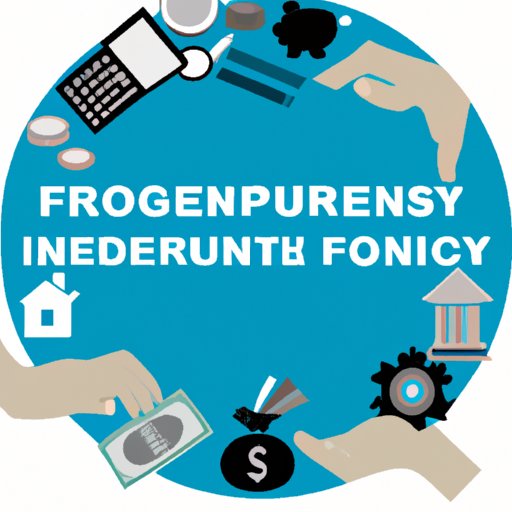Introduction
Financial recovery is the process of restoring stability to your finances. It involves creating a budget, cutting back on unnecessary expenses, negotiating with creditors for better repayment terms, seeking out additional income sources, taking advantage of government assistance programs, and investing in long-term assets. In this article, we will cover all of these topics in detail so you can get back on track financially.
Create a Budget and Stick to It
Creating a budget is one of the most important steps in financial recovery. A budget allows you to track your income and expenses, so you can make sure you are not overspending. It also helps you set financial goals and stay motivated to reach them. Fortunately, creating a budget is easier than ever with the help of online budgeting tools.
When creating a budget, it’s important to be realistic about your income and expenses. Start by listing out your monthly income, such as your salary, any investments, or other sources of income. Then, list out your fixed expenses, such as rent, utilities, and transportation costs. Finally, list out your variable expenses, such as groceries, entertainment, and clothes. Once you have an accurate picture of your income and expenses, you can then create a plan for how much you can spend each month.
Sticking to a budget can be difficult, especially if you’re used to spending freely. To help you stay on track, try setting up automatic transfers from your checking account to your savings account. This way, you won’t have to think about it, and you’ll be able to save money without even realizing it. You should also reward yourself for sticking to your budget by doing something special, such as treating yourself to a nice dinner or buying a small gift.

Cut Back on Unnecessary Expenses
Cutting back on unnecessary expenses is another key part of financial recovery. The first step is to identify what your unnecessary expenses are. These are typically items that you don’t need, but buy anyway because they bring you pleasure. Examples include eating out, shopping for clothes or gadgets, or going to the movies. Once you have identified your unnecessary expenses, you can start to cut back.
One strategy to help you cut back is to limit yourself to a certain amount of discretionary spending each month. For example, you might decide that you can only spend $50 per month on eating out. Another strategy is to substitute cheaper alternatives. Instead of going out to eat, you could cook at home. Instead of buying new clothes, you could shop at thrift stores or swap clothes with friends. By cutting back on unnecessary expenses, you can free up more money to put towards your financial goals.
Negotiate with Creditors for Better Repayment Terms
If you are struggling to pay your debts, you may be able to negotiate with your creditors for better repayment terms. Before you start negotiating, make sure you have a clear understanding of your financial situation and how much you can afford to pay each month. You should also do some research and find out what kind of deals other people have been able to get. This will give you an idea of what you can ask for.
When you are ready to start negotiating, be polite and professional. Explain your financial situation and why you are asking for a better deal. Be prepared to offer something in return, such as a lump sum payment or a longer repayment period. If your creditors refuse to budge, you can always look into debt consolidation or debt settlement programs.

Seek Out Additional Income Sources
Finding additional income sources is another great way to get back on track financially. There are many different options available, such as freelancing, starting a business, or taking on a part-time job. Before deciding which option is right for you, consider the pros and cons of each. Freelancing gives you the flexibility to work when you want, but it can be challenging to find enough clients. Starting a business requires a lot of time and effort, but it has the potential to provide a steady stream of income. Taking on a part-time job can be a great way to supplement your income, but it may not leave you with enough time to pursue other opportunities.

Take Advantage of Government Assistance Programs
The government offers a variety of assistance programs for those who are struggling financially. These can include food stamps, rental assistance, tax credits, and more. Eligibility requirements vary depending on the program, so it’s important to do your research and make sure you qualify. You can apply for assistance through your local government office or online.
Invest in Long-Term Assets
Investing in long-term assets is another great way to improve your financial situation. Investing allows you to take advantage of compound interest, meaning the value of your investments will grow over time. Some common investments include stocks, bonds, mutual funds, and real estate. Before investing, make sure you understand the risks involved and consult a financial advisor if necessary.
Conclusion
Financial recovery is a process that takes time and dedication. By following the steps outlined in this article, you can get back on track financially. Start by creating a budget and sticking to it, then cut back on unnecessary expenses, negotiate with creditors for better repayment terms, seek out additional income sources, take advantage of government assistance programs, and invest in long-term assets. With the right strategy, you can achieve financial freedom.
(Note: Is this article not meeting your expectations? Do you have knowledge or insights to share? Unlock new opportunities and expand your reach by joining our authors team. Click Registration to join us and share your expertise with our readers.)
